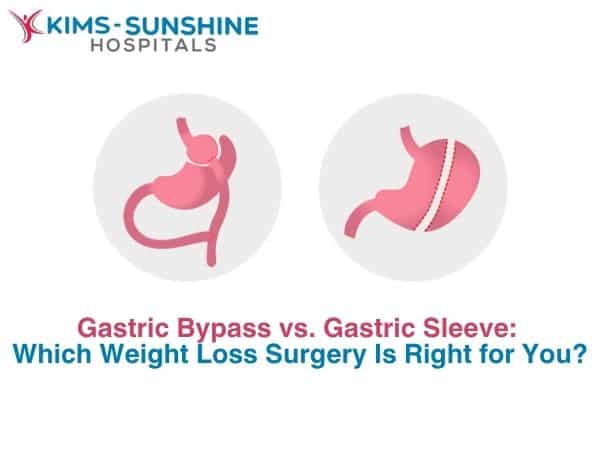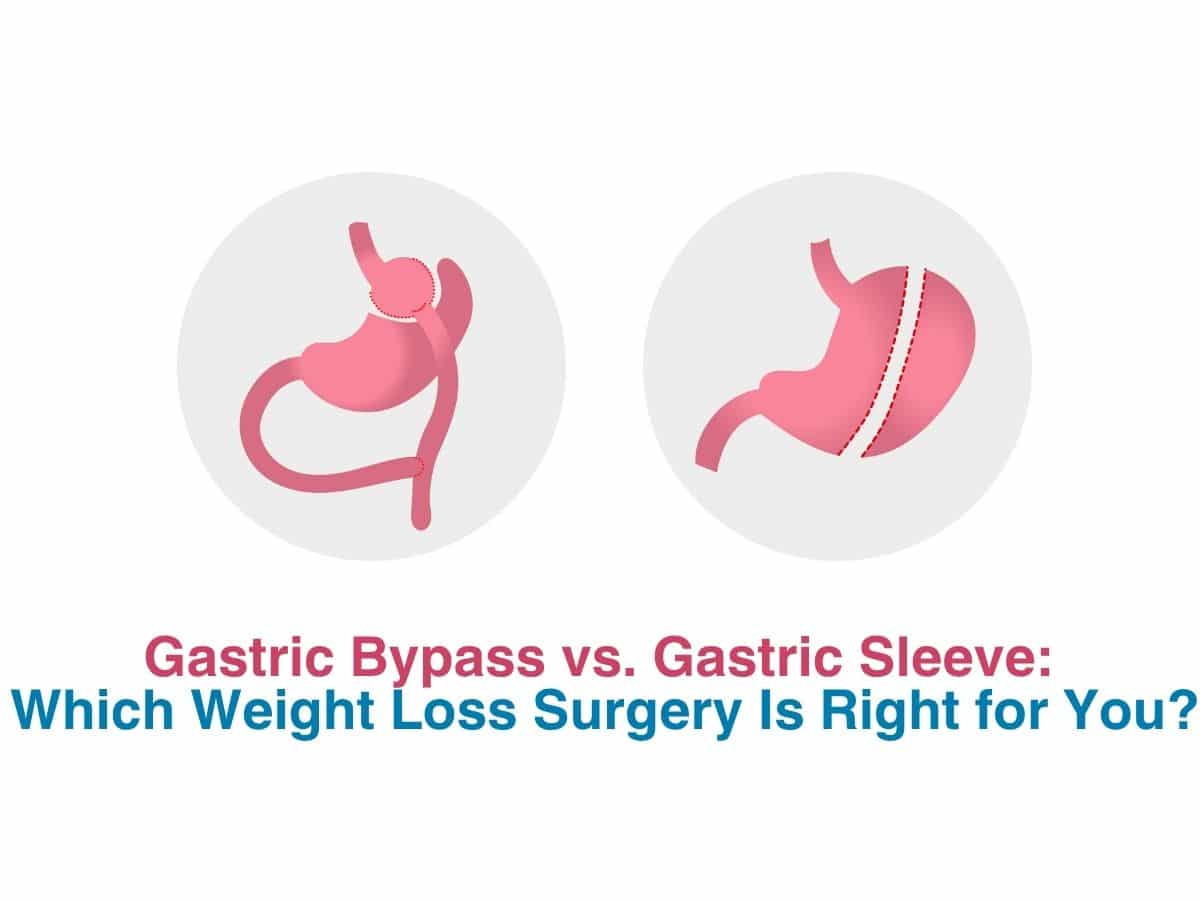
Gastric Bypass vs. Gastric Sleeve: Which Weight Loss Surgery Is Right for You?
 Obesity is a condition where your body mass index is much higher than 30kg/㎡ and it is a growing healthcare concern in India over the past few decades. It affects more women than men in India- with over 40% of women and almost 12% of men having more abdominal fat than usual. Obesity can cause other medical conditions like metabolic syndromes, hypertension, heart disease, liver disease, fertility issues etc. and the list keeps getting longer as more research is done. Bariatric surgery is recommended when someone who is morbidly obese or very overweight is not able to lose weight even after making substantial changes to their diet, exercise and daily routine. The end goal of this surgery is to make the individual eat less and continue to lose weight. Gastric bypass and gastric sleeve surgery are two types of bariatric surgeries.
Obesity is a condition where your body mass index is much higher than 30kg/㎡ and it is a growing healthcare concern in India over the past few decades. It affects more women than men in India- with over 40% of women and almost 12% of men having more abdominal fat than usual. Obesity can cause other medical conditions like metabolic syndromes, hypertension, heart disease, liver disease, fertility issues etc. and the list keeps getting longer as more research is done. Bariatric surgery is recommended when someone who is morbidly obese or very overweight is not able to lose weight even after making substantial changes to their diet, exercise and daily routine. The end goal of this surgery is to make the individual eat less and continue to lose weight. Gastric bypass and gastric sleeve surgery are two types of bariatric surgeries.
Difference Between Gastric Bypass And Gastric Sleeve Surgery
Gastric bypass is a procedure where most of the stomach and a part of the small intestine is surgically removed, leaving only a small pouch in place, which is then reconnected to the remaining intestinal tissue. Since the stomach produces many important enzymes and acid needed to digest food, this part is sewn into the small intestine a little distance away. Since the size of the stomach is much smaller than before you will begin to lose weight, as you will eat less and even less calories and nutrients are absorbed by the small intestine in the process.
Gastric sleeve surgery is a procedure where the surgeon removes over 80% of the stomach itself, while sewing the remaining 20% into a much smaller pouch. No other parts are touched in this procedure.
Gastric bypass is a harder procedure to do, as there are two steps. Gastric sleeve takes only one step to finish.
How To Choose Between Gastric Sleeve And Bypass Surgery
Since both surgeries achieve pretty much the same thing in slightly different ways- it becomes important for you as the patient to understand which one may be a better option for you. If none of the advice has ever worked, you have very severe heartburn and you are not able to move around freely or think that your quality of life has dropped drastically, a gastric bypass is a better option to keep the weight off. With gastric bypass, the hormones that govern your hunger cues get affected and hence they won’t be produced as much- which means you will not feel as hungry nor will you be able to eat like before. But, this can also mean you will suffer from nutritional deficiencies as the gut is not able to absorb nutrients like before.
With gastric sleeve surgery, weight loss may be a little slower, but the amount of food you can eat will be a lot less than before, which means you will lose weight due to a substantial calorie deficit.
Risks And Complications Of Gastric Bypass And Gastric Sleeve Surgeries
Bariatric surgery does not have a lot of risks or complications, but you should be aware of what may happen. So, let us look at them below-
- You may have blood loss or deep vein thrombosis
- You may end up with a pulmonary embolism
- You may not react well to general anaesthesia
- You could develop pneumonia in some cases
- Gallstones and gastric fluid leakage may occur in a few cases.
- You may be constipated
- You may have very saggy skin if weight loss is rapid
- If you get gastric sleeve surgery, then you may be at a higher risk of suffering from reflux. Gastric bypass can cause ulcers or bowel obstruction too.
With both types of surgeries, post operative dietary care is super crucial. You can drink only liquids in the first week or so, after which it can be light soups or purees or mushy food. After about 6-8 weeks, you will be asked to start with solids. You will need to stick to some changes afterwards, forever-
- Like eating slowly, being more mindful and chewing well
- You cannot or MUST not drink using a straw or drink quickly. Sipping slowly should become the new normal.
- No more carbonated water or beverages.
- The stomach has the natural capacity to stretch, so you should NOT overeat. When you eat more, you will force your pouch to expand more, which means you can accommodate more food. Then you feel hungry, end up eating more and you may not lose weight as planned. It is a vicious cycle to deal with.
Conclusion
Some of the long term benefits of getting either of these procedures include losing weight, improving issues like diabetes, hypertension, heart disease, hyperlipidemia, stroke, fatty liver, joint pain or sleep apnea. You will need to be diligent about following post surgery care and diet restrictions as they are for your own good. Supplementing can also be suggested as you will most probably have to deal with a nutritional deficiency otherwise. Before you jump to surgery as an option, think long and hard if a diet or proper exercise will fix your waistline.






